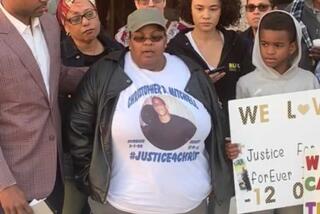U.S. High Court Leaves Tyberg Facing Retrial
- Share via
The U.S. Supreme Court refused Monday to intervene in the Charles Tyberg murder case, rejecting a request by California authorities that the murder conviction of the deputy sheriff’s son be reinstated.
The decision returns Tyberg’s case to the trial courts, where San Diego County prosecutors will seek to retry the 20-year-old on a charge of murdering San Diego Police Officer Kirk Johnson in February, 1983. After his conviction that year, Tyberg was sentenced to 27 years to life in prison.
A state appellate court threw out Tyberg’s conviction in June, ruling that homicide detectives had tricked him into confessing--by, among other tactics, assuring him at one point in their interrogation, “We’re here to help ya.”
The state attorney general’s office appealed the California decision to the U.S. Supreme Court, asking the justices to use the Tyberg case to give law enforcement officers clear guidance on whether they can employ deception to obtain criminal confessions. The high court issued its decision in the case without comment, so attorneys could only speculate Monday on why the justices refused to review the ruling of the state 4th District Court of Appeal.
Paul Bell, who represented Tyberg in the appeal, said the Supreme Court may have concurred with the California court’s ruling that the detectives’ conduct was improper. Or else, he said, the justices may simply have agreed with his argument that the case did not pose a legal issue worthy of their consideration.
“There is no new rule announced in the case,” Bell said. “It might make people newly aware of the existing rules--that you don’t offer to help people when you’re interrogating them.”
Deputy Atty. Gen. Frederick Millar Jr. declined to guess at the reasoning behind the high court’s decision. But he said that the case remains deeply troubling to prosecutors and police and that the Supreme Court action is “very disappointing.”
“We felt this was an important question for the court to review so police officers would have guidance as to the proper procedures to follow in questioning suspects,” Millar said. “We felt (the detectives) had followed proper procedure and had not done anything wrong.”
A San Diego homicide detective questioning Tyberg, then 16, after his arrest in March, 1983, sought to minimize the significance of his involvement in Johnson’s death, then told Tyberg he understood that the shooting was “a crazy, spontaneous thing.”
“I know that your little heart’s going to be pounding right outside of your chest right now, OK,” Detective Ron Newman told Tyberg. “But we’re here to help ya, and I mean we’re here to try to understand how this thing happened.”
The 4th District Court said the interrogation tactic was deceptive. “We find it inconceivable the police were there to help the defendant in any way,” the judges said in an opinion reversing Tyberg’s conviction.
Without waiting for the Supreme Court decision, county prosecutors and defense lawyers have been positioning themselves for the legal wrangling over a possible retrial.
A hearing is scheduled Thursday in San Diego County Superior Court on the defense’s move to have the charges against Tyberg dismissed for lack of evidence. Defense attorney Clancy Haynes of Santa Ana contends that the only evidence presented against Tyberg at his preliminary hearing three years ago was his confession, which now has been ruled inadmissible.
Prosecutors plan to refile murder charges against Tyberg even if Superior Court Judge Raul Rosado dismisses the case. They insist there is ample evidence beyond the confession to link the youth to the killing.
Tyberg was wearing his father’s uniform shirt and badge and carrying his .357 magnum revolver when he and two friends jumped into his father’s patrol car for a joy ride in San Clemente Canyon one night in February, 1983.
They were parked in Marian Bear Park when Johnson, 26, pulled his police cruiser alongside. At Tyberg’s trial in Orange County Superior Court, his lawyer contended that the youth panicked when he saw Johnson, killing him with five shots fired at close range.
San Diego police were outraged when Tyberg’s conviction was thrown out, but officials said Monday they do not expect the case to have a significant effect on police practices.
“Based on what I know about it right now, it’s not going to change things very much,” said Lt. Phil Jarvis, homicide division commander.
Deputy Dist. Atty. Michael Carleton, the Police Department’s legal adviser, said he uses the case in training sessions but doubts that any general rules for police conduct can be drawn from it.
“It’s very difficult to say what you can do except to avoid any kind of suggestions that you’re going to ‘help’ the person you’re talking to,” Carleton said.
It is true, he said, that offenders can get lighter sentences for cooperating with law enforcement. And previous court rulings have affirmed that interrogators can tell suspects they will feel better if they tell the truth, Carleton said.
“These cases are very difficult to translate into some sort of training tool for police officers,” he said. “You can just use it as an example of the pitfalls and things you can avoid.”
More to Read
Sign up for Essential California
The most important California stories and recommendations in your inbox every morning.
You may occasionally receive promotional content from the Los Angeles Times.













